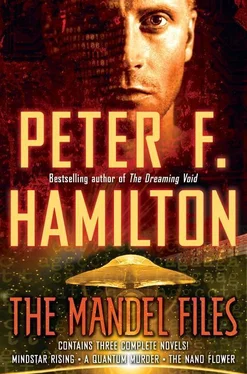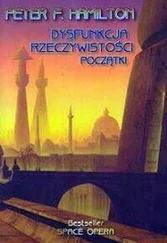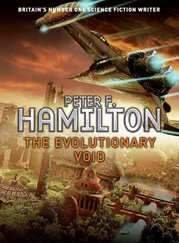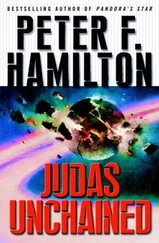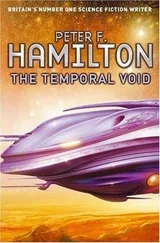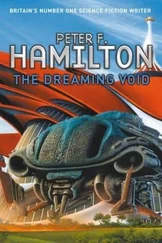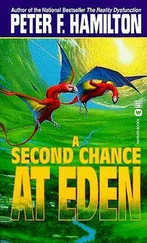“CTCs?” Greg clicked his fingers. “Nicholas Beswick mentioned them. What is one?”
Cormac maintained a blankly impassive expression. Julia knew he was disappointed, having to explain concepts which were so obvious.
“A Closed Timelike Curve is a loop through space-time.”
“No messing?” Greg appeared so innocently interested.
“It has been postulated that they exist on a sub-microscopic scale, forming space-time; approximately ten to the minus power thirty-five metres wide and stretching back ten to the minus power forty-two seconds. Theoretically you could use one to travel into the past.”
“What about creating a paradox?” Gabriel asked, there was bright interest in her eyes. “Killing your own grandfather?”
“If you killed him ten to the minus forty-two of a second ago instead of right here in the present, how would you know?” Morgan asked mildly. “I don’t think you’d notice a vast difference.”
She waved him down irritably, concentrating on Cormac.
“Yes, the classic question,” Cormac said politely. “Travelling back to kill your grandfather before your father was born, thus creating a paradox. If your grandfather was killed how could you have been born to travel back to kill him? This is a null question, because quantum cosmology allows for multiple parallel universes, an infinite stack of space-times with identical physical parameters except each one has a different history-Hitler triumphant, J. F. Kennedy never killed, the PSP remaining in power. If CTCs do exist, the multiple histories will interconnect, effectively integrating the parallel universes into a unified family and facilitating travel between them. In this instance quantum mechanics permits the establishment of as many connected universes as there are variant outcomes of the time traveller’s actions. So you can travel back in time to kill your grandfather, because in another universe, the one you travelled from, your grandfather will remain alive to conceive your father.”
“Yes.” Gabriel sucked her cheeks in. “Whenever I looked into the future, I saw multiple probabilities; the further into the future the more probabilities there were, and the wilder they became.”
“Wilder?” Julia asked, fascinated.
“Improbable. Mammoths roaming round in Siberia, the Greenhouse effect suddenly reversing, obscure politicians becoming statesmen, weird religions taking hold. I never looked too far,” she added contritely.
Because death haunted those extremes, Julia completed privately.
“Had you looked back in time, you would have seen that same multiplication of alternatives,” Cormac said. “That is what Edward hoped to see.”
“What?” Gabriel asked sharply.
“To look in the past.”
“You said Kitchener was developing a neurohormone to perceive CTCs, not look into the past,” Greg said.
Cormac’s smile was wintry. “But don’t you see, that’s the same thing. Edward theorized that CTCs are the basis of psychic ability.”
Greg and Gabriel exchanged a glance bordering on pained anxiety. What made him think that?” Greg asked.
“These microscopic holes through space-time are too small for physical objects to pass through, so he suggested that they facilitate the exchange of pure data. Your mind, Mr Mandel, is quite literally connected with billions, trillions, of other minds; a vast repository of visual images, smells, tastes, and memories. This so-called psychic trait in certain humans is no more than a superior interpretation ability, you can make sense of our cosmological heritage, filter out the scream of the white noise jumble, pick over the bones.”
“If that’s true, then how could I reach as far as I can? You said these CTCs are microscopic.”
“Indeed, but there are so many of them. If you go down one of these wormholes, back in time for that fraction of a second, move an infinitesimal distance, you will be able to find another CTC at its terminus, perhaps several, and that connection will allow you to extend another increment further outward. You understand? It is like a chain, appallingly convoluted, which accounts for the limits in range you experience, but a clear link none the less, stretching across infinity, and up and down eternity.”
“But I could see into the future,” Gabriel said. “How could these CTCs produce that effect? You said they go back in time.”
“They do. But the now we are in is the past of the futures you perceived.”
“Yes,” said Gabriel, though she sounded unconvinced.
“However, by itself looking into the future isn’t sufficient to prove the existence of CTCs. Psychic is such a prejudicial term, you see, people have always laid claim to the power of foresight. But if CTCs exist, then the past should be available on an equal basis. Edward hoped that by producing a neurohormone capable of opening up the past in the way that precognition opens up the future he would make a case for microscopic CTCs which would be irrefutable. There could be very few alternative explanations.”
“Julia?” Greg’s voice was dead, devoid of all inflection. Everyone looked at him. What was the result of the analysis On those ampoules Eleanor gave you?”
She had some trouble forming the words, her throat had dried up as soon as she started thinking about the implications. “The laboratory said it was a themed neurohormone, sharing some characteristics with the standard precognition formula. But it’s not a type they were familiar with.”
“Edward succeeded in formulating a retrospection neurohormone?” Cormac asked with a feverish note of hope.
“Looks that way, doesn’t it.” Greg was staring at Gabriel. Julia saw she had gone quite white, her hands were trembling slightly.
“No,” Morgan said. He didn’t use a loud voice, but the authority he conveyed was final. He took hold of Gabriel’s hand. “You’re not infusing it.”
“Who else can?” she answered. “My temporal ability is a proven one.”
“You are proposing to use it?” Cormac asked, he blinked owlishly at Gabriel. “Why? We don’t even know if it works, all Edward’s records were erased.”
Julia cursed under her breath. It was a perpetual mystery to her how someone as smart as Cormac could be so oblivious to the problems of life itself. “If it enables us to look into the past, we can use it to see who killed Kitchener,” she told him, using the strained tone reserved for making company divisional managers wish they’d never been born.
Cormac opened his mouth to speak, then glanced at Gabriel, blushing furiously. “I… I’m sorry. I wasn’t thinking. This whole series of events has been extremely stressful…”
He trailed off.
“I’ll infuse it,” Eleanor said.
“No bloody chance!” Greg snapped.
“Why not? These themed neurohormones are designed to amplify single psi traits. Anyone with even a faintly psionic ability should be able to infuse one. And you always say I’m sensitive.”
Greg’s face darkened. “That’s hardly a qualified objective opinion.”
“What have we got to lose? If it doesn’t work, there’s no disaster, we simply carry on the investigation as before. If it does work, we find out who the murderer is.”
It was quite peculiar; Julia was watching Greg gather himself for a tirade, desperately trying to think of some way she could defuse the situation before it degenerated into a vicious personal row. She knew from past experience just how forceful Greg could get when he was really upset. And Eleanor was just as bad. Both of them complete stubborn-heads. But something happened, because Greg suddenly gave Eleanor a perplexed, almost awestruck, stare, and sat back limply in his seat, his anger visibly draining away.
“What is it?” Eleanor asked. She was frowning at his behaviour.”
Читать дальше
